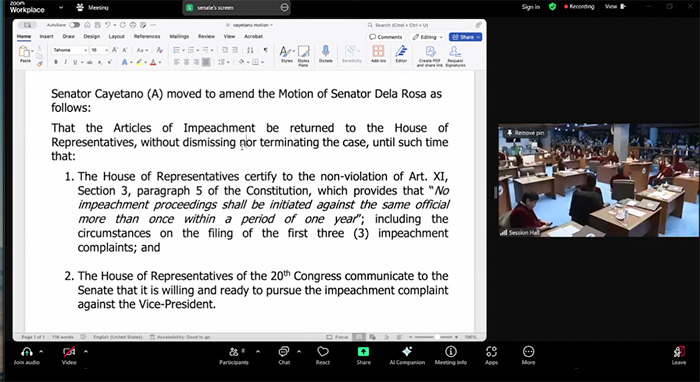Senate returns impeachment complaint vs Sara Duterte to House of Representatives
The Senate has voted to return the impeachment complaint against Vice President Sara Duterte to the House of Representatives.
Before the Senator-judges took their oaths, Sen. Bato Dela Rosa moved to dismiss Duterte's impeachment case. He argued that earlier complaints filed against the VP in the House, which did not make it past the committee level, had constituted multiple impeachment proceedings within a year—something banned under the Philippine constitution.
This, however, was amended by Senator-judge Alan Peter Cayetano, who moved to return the Articles of Impeachment to the House, without dismissing nor terminating the case until:
- The House of Representatives certifies to the non-violation of Art. XI, Section 3, paragraph 5 of the Constitution, which provides that "No impeachment proceedings shall be initiated against the same official more than once within the period of one year"; including the circumstances on filing of the first three impeachment complaints
- The House of Representatives of the 20th Congress communicate to the Senate that it is willing and ready to pursue the impeachment complaint against the Vice President.

The vote resulted in an 18-5 decision, with only Senator-judges Koko Pimentel, Risa Hontiveros, Nancy Binay, Grace Poe, and Sherwin Gatchalian opposing Cayetano's motion.
"Kung aayaw tayo kaagad ni hindi natin na-try, ipalabas 'yung mga facts, wala na pong matatakbuhang ibang body. A motion which cuts short the entire process is unconstitutional," Pimentel said.
Hontiveros noted that remanding or returning the complaint is the same as dismissing it, adding that the prosecution and defense should be able to comment on the motion.
"Remanding is a functional dismissal. Parang dinrible natin ng matagal tapos pinasa natin ang bola. 'Di po kailangan ibalik ang Articles of Impeachment sa House para hingin ang sagot nila sa issueng ito."
Senators don the crimson robes
During the June 10 session, the 23 senators took their oaths as Senator-judges of the impeachment court. Escudero was sworn in on June 9.
All but three—namely, Sen. Imee Marcos, Sen. Robin Padilla, and Sen. Cynthia Villar—wore the Oxford crimson robes.
According to a Philippine STAR report, Marcos said she didn't have a robe, Villar said she was not able to have hers fitted, while Padilla said his didn't fit.
Marcos noted that she took the oath ad cautelam, or for caution, while Padilla said he took it with reservations.
What comes next?
Senate President/presiding officer Chiz Escudero has issued a writ of summons for Duterte. She has 10 days to file her answer to the Articles of Impeachment. The prosecutors may reply to this within a period of five days.
The presiding officer also said that the reading of the Articles of Impeachment on June 11 would be "rendered moot," as the Senate decided to refer it to the Committee on Rules, which served as the basis of the convening of the impeachment court.
The impeached official would have to answer (or plead) to every charge in the Articles of Impeachment on her own or through a representative. According to the UP College of Law, a refusal to do so would mean they entered a "not guilty" plea.
Senators will then hear arguments and witnesses from both sides, which will be followed by closing arguments.
The impeachment trial requires a two-thirds vote to remove the impeached official from power. If it's the president who's on trial, the SC's Chief Justice shall preside but cannot vote.
On Feb. 5, the House of Representatives impeached Duterte, citing a series of grave allegations, including conspiracy to assassinate President Ferdinand Marcos Jr., large-scale corruption, abuse of public funds, and involvement in extrajudicial killings.
On the same day after the House's filing, the Senate went to recess without tackling Duterte's impeachment. It resumed its session on June 2, during which the House's panel of prosecutors was initially scheduled to read the impeachment charges against Duterte. It was moved to June 11 to "allow the Senate to tackle priority legislative measures before the 19th Congress adjourns."
Escudero faced criticism over the four-month delay in impeachment proceedings. (with reports from AFP)


